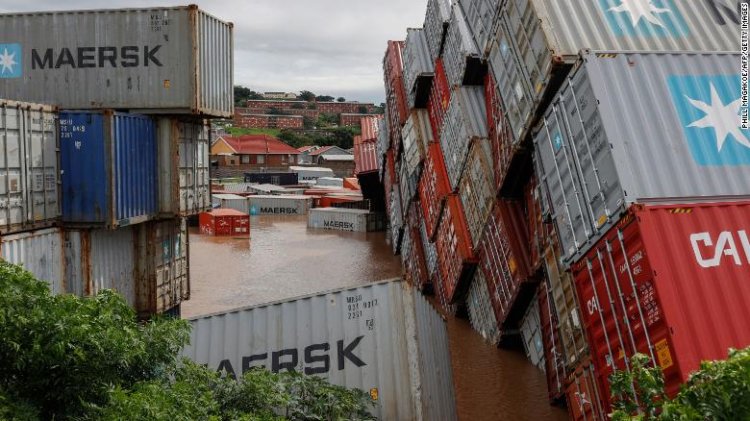In South Africa, heavy rains and flooding have killed 59 people and swept away highways.
The harsh weather comes only months after torrential rains and floods wreaked havoc in other regions of southern Africa, with three tropical cyclones and two tropical storms hitting the region in the space of six weeks beginning in late January.

Heavy rains and floods have wreaked havoc on South Africa's eastern coast, killing at least 59 people, wrecking roads, and forcing authorities to advise inhabitants to stay at home.
The floods affected the KwaZulu-Natal region, which contains the coastal city of Durban, where roads broke and deep fissures appeared, and a massive stack of shipping containers tumbled into muddy waters, according to news agency photos. People were left on both sides of a bridge near Durban after it was carried away.
Since Monday, KwaZulu-Natal has been hit by torrential rains, which the provincial administration described as "one of the worst weather events in the history of our country" in a statement posted to Facebook, along with the death toll.
"The torrential rains that have rained on our land over the past several days have wreaked havoc and caused significant damage to lives and infrastructure," the statement added.
Teams have been evacuating people from regions affected by "mudslides, flooding, and structural collapses of houses and roads," according to Sipho Hlomuka, a member of KwaZulu-Executive Natal's Council for Co-operative Governance and Traditional Affairs.
"The torrential rains have caused damage to power lines in numerous municipalities, and technical teams are working around the clock to restore power," Hlomuka said.
In the hard-hit wine municipality, power stations have been inundated and are inaccessible, according to Mayor Mxolisi Kaunda, while water mains have also been damaged.

He added the local administration has urged private and religious groups to help with emergency relief efforts, as well as requesting aircraft support from the South African National Defense Force.
The harsh weather comes only months after torrential rains and floods wreaked havoc in other regions of southern Africa, with three tropical cyclones and two tropical storms hitting the region in the space of six weeks beginning in late January.
There were 230 deaths reported, and 1 million people were impacted.
Climate change made extreme weather occurrences more likely, according to scientists from the World Weather Attribution (WWA) project, which examines how much the climate issue may have contributed to an extreme weather event.
"Again, we see how the people who have the least responsibility for climate change are experiencing the brunt of the repercussions," WWA's Friederike Otto, from Imperial College London's Grantham Institute for Climate Change and the Environment, said Tuesday, pointing to past storms in southern Africa.
"Rich countries should keep their promises and enhance much-needed money for adaptation and loss and damage reimbursements to victims of catastrophic events caused by climate change," she added.

The extreme weather occurrences in southern Africa come as tensions rise between developed and developing countries about who should bear the brunt of the climate catastrophe's damage and consequences. This is expected to be a major sticking point at the next international climate negotiations, the COP27 conference in Sharm el-Sheikh, Egypt in November.
Scientists have warned that the world must aim to keep global warming to 1.5 degrees Celsius over pre-industrial temperatures (about 200 years ago) to avoid irreversible climate change effects. The Earth has already warmed by 1.2 degrees Celsius.
Warming of 2 degrees Celsius is expected to increase the frequency and intensity of heavy rain and flooding in southeastern Africa, as well as the strength of strong tropical cyclones, which are associated with increased rainfall.

 Boakyewaa Lawrencia
Boakyewaa Lawrencia 


































